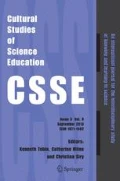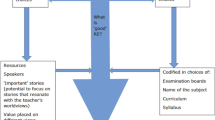Abstract
In this paper I discuss the tension created by religion and science in one student’s understanding of knowledge and truth by exploring two questions: “How do individuals accommodate their religious beliefs with their understanding of science?” and “How does religious knowledge interact with scientific knowledge to construct meaning?” A constructivist framework sheds light on the answers to both questions in the context of process and product.
Similar content being viewed by others
References
Cambridge University Press. (2009). Cambridge advanced learners dictionary. Retrieved April 1 2009, from http://dictionary.cambridge.org/define.asp?key=44956&dict=CALD.
Cobern, W. W. (2000). The nature of science and the role of knowledge and belief. Science & Education, 9, 219–246.
Dagher, Z. R., & BouJaoude, S. (1996). Scientific views and religious beliefs of college students: The case of biological evolution. Journal of Research in Science Teaching, 34, 429–445.
Guba, E. G., & Lincoln, Y. S. (1989). Fourth generation evaluation. Beverly Hills, CA: Sage.
Holland, D., Lachiotte, W., Jr., Skinner, D., & Cain, C. (2001). Identity and agency in cultural worlds. Cambridge, MA: Harvard University Press.
Ministry of Education. (2005a). Science grade 3. Province of British Columbia integrated resource package. Retrieved April 1 2009, from http://www.bced.gov.bc.ca/irp/sci_7.pdf.
Ministry of Education. (2005b). Science grade 5. Province of British Columbia integrated resource package. Retrieved April 1 2009, from http://www.bced.gov.bc.ca/irp/sci_7.pdf.
Ministry of Education. (2005c). Science grade 7. Province of British Columbia integrated resource package. Retrieved April 1 2009, from http://www.bced.gov.bc.ca/irp/sci_7.pdf.
Patton, M. Q. (2002). Qualitative evaluation and research methods (3rd ed.). Thousand Oaks, CA: Sage.
Roth, W.-M., & Alexander, T. (1997). The interaction of students’ scientific and religious discourses: Two case studies. International Journal of Science Education, 19, 125–146.
Roth, W.-M., & Lucas, K. (1997). From “truth” to “invented reality”: A discourse analysis of high school physics students’ talk about scientific knowledge. Journal of Research in Science Teaching, 34, 145–179.
Schwandt, T. A. (2000). Three epistemological stances for qualitative inquiry: Interpretivism, hermeneutics, and social constructionism. In N. K. Denzin & Y. S. Lincoln (Eds.), Handbook of qualitative research (pp. 189–213). Thousand Oaks, CA: Sage.
Simmons, K. (2009). Scientific method. Retrieved, April 1 2009, from http://kentsimmons.uwinnipeg.ca/cm1504/introscience.htm.
Wardekker, W. L., & Miedema, S. (2001). Identity, cultural change, and religious education. British Journal of Religious Education, 23(2), 76–87.
Author information
Authors and Affiliations
Corresponding author
Rights and permissions
About this article
Cite this article
Starr, L.J. Does anyone really know anything? An exploration of constructivist meaning and identity in the tension between scientific and religious knowledge. Cult Stud of Sci Educ 5, 191–200 (2010). https://doi.org/10.1007/s11422-009-9227-0
Received:
Accepted:
Published:
Issue Date:
DOI: https://doi.org/10.1007/s11422-009-9227-0




